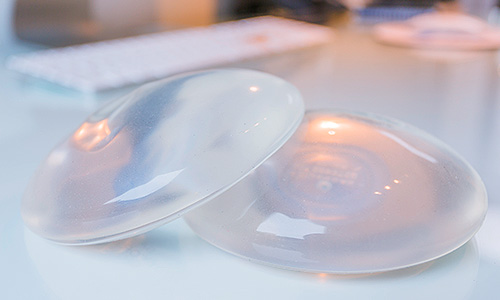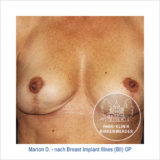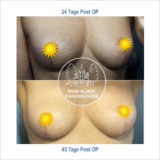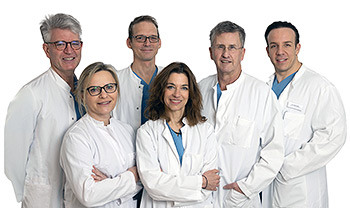
Dear Patients, We would like to inform you here on the topic “Breast Implant Illness” (BII). Currently, we receive many inquiries from patients from all over Germany, who are looking for help.
Currently, there is no clear medical evidence for the existence of this disease, as the relationship between the symptoms and the silicone implants could not be finally clarified. Nonetheless, more and more patients are reporting with complaints that have occurred after the implantation of silicone implants.
Overall, it concerns non-specific complaints such as u.a. Tiredness, headache, rash, nausea and palpitations. These are not reserved for the BII alone, but can have a variety of causes.
In any case, before any surgical treatment is considered, various methods of examination must first be performed, such as blood tests, to clarify other causes that may be responsible for the symptoms. The BII remains an exclusion diagnosis. If these measures have already been taken unsuccessfully, there often remains the great suffering that pushes the patients to surgical therapy.
If all other disabling options are eliminated, the complete removal of the silicone implants can be done by surgery. Often there is a desire to balance the subsequently missing breast volume. We offer our patients the possibility to transplant autologous fat according to the BEAULI procedure in the same operative session.
Concerned that the symptoms may continue to persist, in addition to removing the implants, patients ask for removal of the capsule that has formed around the silicone implant. This concern is often based on the erroneous assumption that the biofilm created after implant placement, which is considered to be co-responsible for the condition, may remain in the capsule. The fact, however, is that biofilms only cover foreign bodies, in this case the silicone implants, not the capsule formed by the body.
In addition, the volume loss due to this more radical procedure is not negligible, so that the breast is smaller than before. In addition, due to the large wound surface, if desired, the rate of healing of the autologous fat is significantly reduced. Therefore, given that the capsule is absorbed by the body after removal of the implants, the en-bloc procedure does not seem necessary. If, on the basis of this knowledge, patients continue to desire this procedure, this procedure can, of course, be carried out.


If it is a BII, the removal of the silicone implants will improve to complete symptom relief. However, as the symptoms are nonspecific and may also occur in patients without silicone implants, it is possible that the symptoms will persist even after the procedure. Currently it is not possible to estimate this already before an operational distance.
[...] There has been a worldwide increase in the number of patients requesting implant removal for a variety of systemic symptoms that they attribute to their implants. This has been referred to as Silicone Incompatibility Syndrome (SIS), Autoimmune/Inflammatory Syndrome Induced by Adjuvants (ASIA), and Breast Implant Illness (BII).1
In the US, the Food and Drug Administration (FDA) has included systemic symptoms in a box warning that is required for all implants sold in the US which states, “Patients receiving breast implants have reported a variety of systemic symptoms such as joint pain, muscle aches, confusion, chronic fatigue, autoimmune diseases, and others. Individual patient risk for the development of these symptoms has not been well established. Some patients report complete resolution of symptoms when the implants are removed without replacement.”2
Patients with self-described symptoms request removal of the implant and capsule, “en bloc”. Their concern is that toxins from the implant, such as heavy metals, including platinum, silicone, and/or bacteria and fungus, could be in the capsules and failure to remove the capsule would leave toxins behind and could preclude symptom improvement. For that reason, they seek out surgeons who guarantee total en bloc capsulectomy and this is perpetuated on some social media sites as well as by surgeons who promote themselves as “explant experts”.3
You can download the entire ISAPS statement on breast implant removal and capsulectomy under the following link:

... So no toxins could get into my body, they stayed in the capsule that had formed around the implant. In addition, he conjured up a pretty, natural breast for me by tightening it. I would also like to say a big compliment to the entire team. I was looked after in a very loving and friendly manner, my felt 1000 questions were answered in a friendly and detailed manner. I couldn't have picked a better clinic. Many thanks for everything!
Marion D.


... foreign body sensation, a sharp edge was sticking out. Over the years I've been to surgeons/radiologists to have my breasts examined, all with no significant findings, the tip is an optical defect, the implant is a bit compressed at the point. For about 2 years, recurring pain in the chest, sometimes more sometimes less and meanwhile already an 80E due to 5kg more on the ribs.
Then in October of this year I was in such pain that I became more and more concerned with the topic of explantation, went to a group at FB that informed about BII (Breast Implantation Illness) and read a lot about problems with silicone implants. A good friend gave me the tip to have a consultation with Dr. to agree on transfers. That's what I did and after a detailed and great consultation (capsular fibrosis was found) I decided to have an explantation with tightening and build-up with some fat in the décolleté area (Beauli method).
I wanted my breasts to be natural again, without any pain and foreign body sensation, and I also definitely wanted them smaller (small 80C). I am now 11 days post op and I am so happy, Dr. Ueberreiter has accomplished a feat. My breasts already look beautiful, although I still have tape on the scars. The shape is just gigantic. I have my check-up appointment next Friday and then I'll see her properly, without the tapes. But you can already guess that the scars will be very fine.
I was in the Park Klinik Birkenwerder for 2 days and had received an all-round carefree package. Also my anesthetist Dr. Schmuck did a great job, no problems during and after the operation, I felt great right away. He came back to the OR and the next day to ask how I was. The nurses are just great too, I just felt super comfortable there.



Dr. med. Ursula Tanzella and her team will be happy to advise you personally.